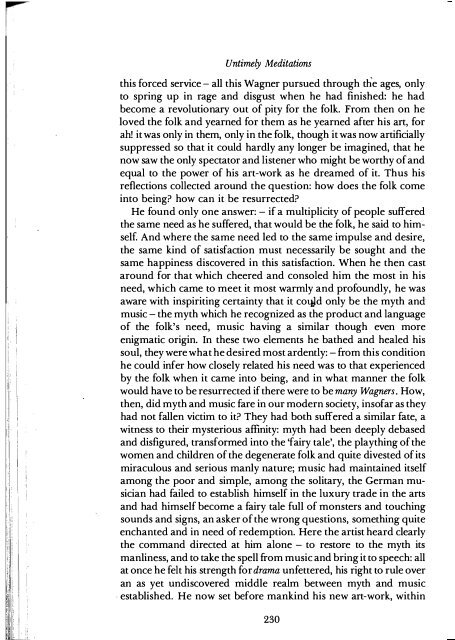Friedrich_Nietzsche - Untimely_Meditations_(Cambridge_Texts_in_the_History_of_Philosophy__1997)
Friedrich_Nietzsche - Untimely_Meditations_(Cambridge_Texts_in_the_History_of_Philosophy__1997)
Friedrich_Nietzsche - Untimely_Meditations_(Cambridge_Texts_in_the_History_of_Philosophy__1997)
Create successful ePaper yourself
Turn your PDF publications into a flip-book with our unique Google optimized e-Paper software.
i\! -, I, I,I!-ln<strong>Untimely</strong> <strong>Meditations</strong>this forced service - all this Wagner pursued through <strong>the</strong> ages, onlyto spr<strong>in</strong>g up <strong>in</strong> rage and disgust when he had f<strong>in</strong>ished: he hadbecome a revolutionary out <strong>of</strong> pity for <strong>the</strong> folk. From <strong>the</strong>n on heloved <strong>the</strong> folk and yearned for <strong>the</strong>m as he yearned after his art, forah! it was only <strong>in</strong> <strong>the</strong>m, only <strong>in</strong> <strong>the</strong> folk, though it was now artificiallysuppressed so that it could hardly any longer be imag<strong>in</strong>ed, that henow saw <strong>the</strong> only spectator and listener who might be worthy <strong>of</strong> andequal to <strong>the</strong> power <strong>of</strong> his art-work as he dreamed <strong>of</strong> it. Thus hisreflections collected around <strong>the</strong> question: how does <strong>the</strong> folk come<strong>in</strong>to be<strong>in</strong>g? how can it be resurrected?He found only one answer: - if a multiplicity <strong>of</strong> people suffered<strong>the</strong> same need as he suffered, that would be <strong>the</strong> folk, he said to himself.And where <strong>the</strong> same need led to <strong>the</strong> same impulse and desire,<strong>the</strong> same k<strong>in</strong>d <strong>of</strong> satisfaction must necessarily be sought and <strong>the</strong>same happ<strong>in</strong>ess discovered <strong>in</strong> this satisfaction. When he <strong>the</strong>n castaround for that which cheered and consoled him <strong>the</strong> most <strong>in</strong> hisneed, which came to meet it most warmly and pr<strong>of</strong>oundly, he wasaware with <strong>in</strong>spirit<strong>in</strong>g certa<strong>in</strong>ty that it coqJd only be <strong>the</strong> myth andmusic - <strong>the</strong> myth which he recognized as <strong>the</strong> product and language<strong>of</strong> <strong>the</strong> folk's need, music hav<strong>in</strong>g a similar though even moreenigmatic orig<strong>in</strong>. In <strong>the</strong>se two elements he ba<strong>the</strong>d and healed hissoul, <strong>the</strong>y were what he desired most ardently: - from this conditionhe could <strong>in</strong>fer how closely related his need was to that experiencedby <strong>the</strong> folk when it came <strong>in</strong>to be<strong>in</strong>g, and <strong>in</strong> what manner <strong>the</strong> folkwould have to be resurrected if <strong>the</strong>re were to be many Wagners. How,<strong>the</strong>n, did myth and music fare <strong>in</strong> our modern society, <strong>in</strong>s<strong>of</strong>ar as <strong>the</strong>yhad not fallen victim to it? They had both suffered a similar fate, awitness to <strong>the</strong>ir mysterious aff<strong>in</strong>ity: myth had been deeply debasedand disfigured, transformed <strong>in</strong>to <strong>the</strong> 'fairy tale', <strong>the</strong> playth<strong>in</strong>g <strong>of</strong> <strong>the</strong>women and children <strong>of</strong> <strong>the</strong> degenerate folk and quite divested <strong>of</strong> itsmiraculous and serious manly nature; music had ma<strong>in</strong>ta<strong>in</strong>ed itselfamong <strong>the</strong> poor and simple, among <strong>the</strong> solitary, <strong>the</strong> German musicianhad failed to establish himself <strong>in</strong> <strong>the</strong> luxury trade <strong>in</strong> <strong>the</strong> artsand had himself become a fairy tale full <strong>of</strong> monsters and touch<strong>in</strong>gsounds and signs, an asker <strong>of</strong> <strong>the</strong> wrong questions, someth<strong>in</strong>g quiteenchanted and <strong>in</strong> need <strong>of</strong> redemption. Here <strong>the</strong> artist heard clearly<strong>the</strong> command directed at him alone - to restore to <strong>the</strong> myth itsmanl<strong>in</strong>ess, and to take <strong>the</strong> spell from music and br<strong>in</strong>g it to speech: allat once he felt his strength fo r drama unfettered, his right to rule overan as yet undiscovered middle realm between myth and music,established. He now set before mank<strong>in</strong>d his new art-work, with<strong>in</strong>230


